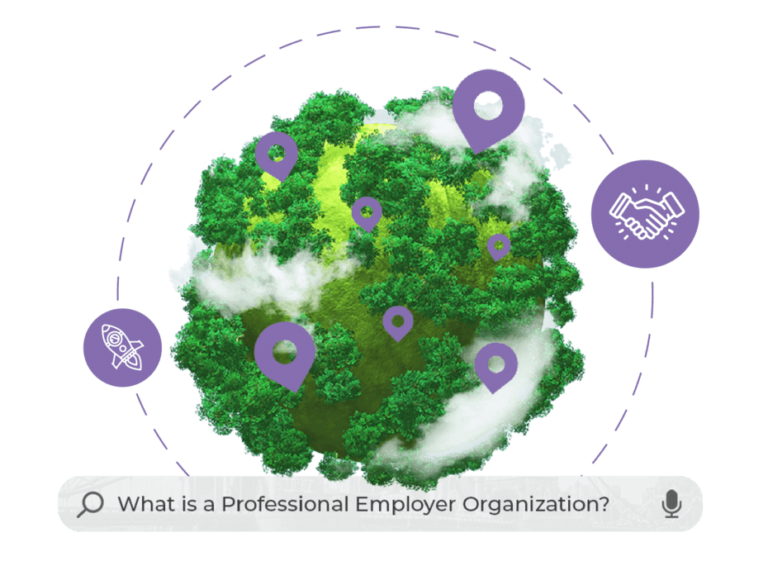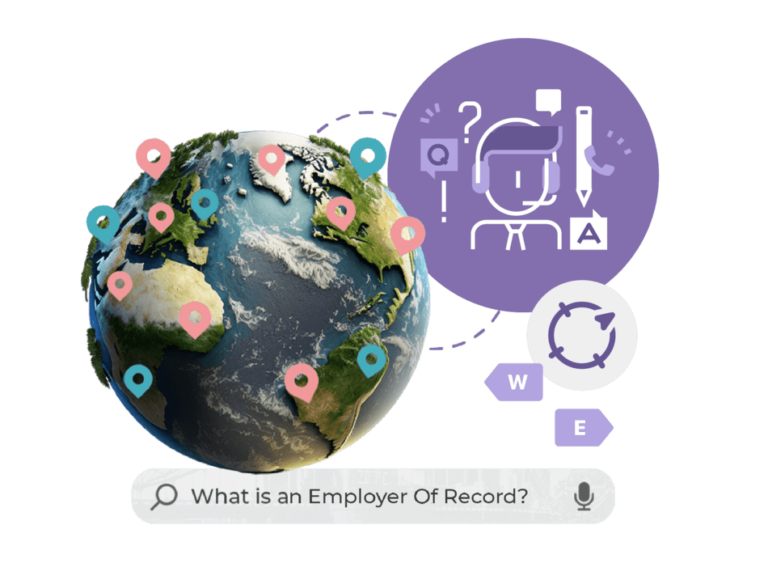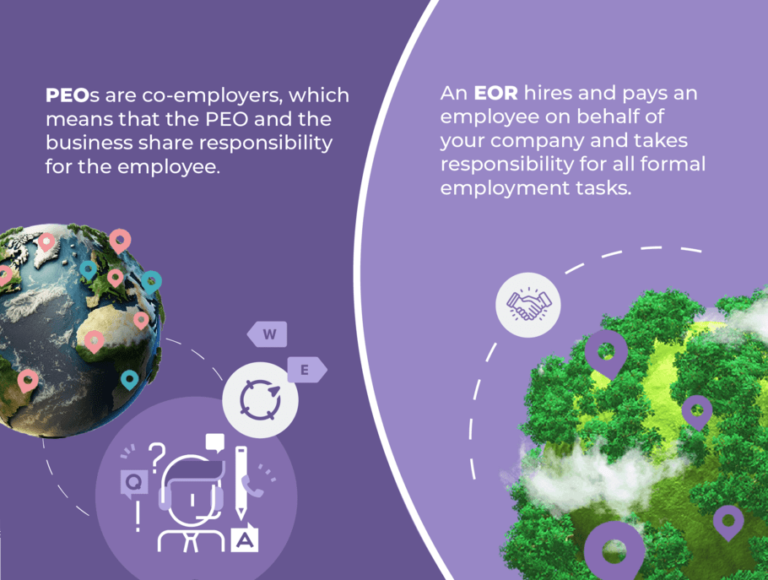PEO vs EOR:
What's The Difference?
For the most part, a worker’s location is no longer a crucial point for hiring nowadays, as companies are prone to hunt for top candidates across borders. But to hire globally, businesses need to choose between a PEO vs EOR.

Katie Jones
Content Writer
Key Chapters:
The main difference between a PEO and an EOR is that a PEO shares employer responsibilities with your company, whereas an EOR takes on the legal employer role. While they provide similar services, understanding the key differences between the two terms is the first step to managing your global workforce effectively.
In this guide, we’ll discuss all there is to know about PEOs and EORs, their key differences, and the important factors to consider when choosing a solution for your business.
The main difference between a PEO and an EOR is that a PEO shares employer responsibilities with your company, whereas an EOR takes on the legal employer role. While they provide similar services, understanding the key differences between the two terms is the first step to managing your global workforce effectively.
In this guide, we’ll discuss all there is to know about PEOs and EORs, their key differences, and the important factors to consider when choosing a solution for your business.
Skip to a key chapter:
What is a Professional Employer Organization (PEO)?

A PEO is a company that co-employs a client’s workers, streamlining HR functions like compliance, payroll services, and benefits management. Because a PEO is a partner company and not the legal employer, your company is still in charge of the day-to-day operations of your employees and business.
With a PEO partner, you can guarantee compliance with federal and state employment laws, minimizing legal risks. This is particularly important when businesses go international, as the potential for mistakes is far greater.
Why use a PEO?
A PEO is typically chosen when a business already has a legal entity in the target country and seeks to outsource specific HR functions.
A PEO can help business owners with HR tasks that business owners may find challenging to manage on their own, especially when expanding into new countries.
PEOs typically help with:
- Compliance
- HR management
- Risk management
- Talent management
- Payroll and tax filing
- Benefits administration
Read more about PEO solutions:
What is a PEO?
5 Advantages of Using a PEO for Your Business
What is an Employer of Record (EOR)?

An EOR is a company that legally employs workers on behalf of another business in locations where the business does not have a presence. Unlike a PEO, an EOR assumes all legal responsibilities regarding employment, including contracts, salaries, benefits, and taxes.
According to the National Association of Professional Employer Organizations (NAPEO), companies that use a PEO are 50% less likely to go out of business than companies that do not use one.
An employer of record can be located within the same country as the business it employs workers for or in another country with different employment laws. This means that businesses can have peace of mind knowing that the legal ins and outs are taken care of.
Why use an EOR?
An EOR is a particularly valuable asset for businesses that are expanding into new markets or hiring employees in foreign countries. Because an employer of record has already done the hard work of setting up entities worldwide, you can use their expertise to quickly and legally hire people in new regions.
This service is better suited for companies that do not currently operate in the country of interest.
EORs typically help with:
- Administration
- Payroll processing
- Contract termination
- Employee benefit management
- Arranging visa and work permits
- Acting as legal employer for new employees
Read more about EOR solutions:
What is an Employer of Record?
EOR vs Setting Up an Entity: Which is Right for Your Business?
PEO vs EOR: What’s the difference?

HR outsourcing, benefits, onboarding, payroll – these are all terms commonly associated with both PEO and EOR. However, their key differences lie in how they operate.
PEOs are co-employers, which means that the PEO and the business share responsibility for the employee. On the other hand, an EOR hires and pays an employee on behalf of your company and takes responsibility for all formal employment tasks.
PEOs are a better option for businesses that:
- Want to improve HR compliance
- Need to increase the number of full-time employees
- Wish to maintain some control over their HR processes
- Have already set up an entity in the country of interest
EORs are a better option for businesses that:
- Want to offload HR tasks
- Need to temporarily hire staff
- Wish to explore new markets
- Have not set up an entity in country of interest
These two employment partners take many different approaches to cost, scalability, flexibility, suitability, and liability.
To help you weigh up the pros and cons of using a PEO vs. an EOR, the table below summarizes the main distinctions.
| PEO | EOR | |
| Structure | Co-employment relationship | Assumes full legal employment |
| Cost | Generally cheaper than an EOR | More affordable than setting up a local entity |
| Scalability | Best for more full-time employees | Better for temporary and contractual employees |
| Flexibility | Services where you have an entity | Hires employees where you don’t have an entity |
| Suitability | For businesses that want to retain control | For businesses that want to avoid employee liability |
| Liability | Shared risks with PEO | Assumes all employee risks |
* It’s important to keep in mind that these distinctions can vary depending on the provider.
PEO vs EOR: Which option to choose?
Companies of all sizes, stages, and industries can benefit from additional HR support, but choosing the right global employment solution requires careful planning.
Choosing between a PEO and an Employer of Record depends on factors like existing legal structure and the level of control desired by the business.
Since one of the crucial differences between PEO and EOR is that one solution requires the business to have its own legal entity and the other doesn’t, this should also be a decisive factor to consider.
A PEO will better suit your business if you agree with the following statements:
- I already have an entity set up in my country of interest
- I want to remain in full control over overall management
- I have time to navigate and manage legal compliance intricacies
- I’m looking at hiring a higher number of employees for a longer period
An EOR will better suit your business if you agree with the following statements:
- I don’t have a legal entity in the country of interest
- I don’t want legal responsibility for my employees
- Speed to market is essential for my business
- I’m looking to fill a few contractor-based roles for shorter-term projects
All-in-one global workforce management with Gibson Watts Global
At Gibson Watts Global, we understand that HR support is not a one-size-fits-all solution, which is why we offer our clients the flexibility to choose between our PEO/EOR services. With our expertise, we can help you manage your people operations on both a national and global scale.
While there are a variety of options in the market for businesses to pursue when expanding globally, we are unique in that we are a people-focused organization, unlike software-based alternatives on the market. A business is only as good as its people, after all.
Need more help deciding which service is right for you? Or perhaps you’re further down the line and ready to get started. Reach out to us today and one of our experts will be in touch shortly.
Alternatively, if you’d like to learn more about the countries we operate in, their cultures, and best employment practices, you can visit our Country Guides.
